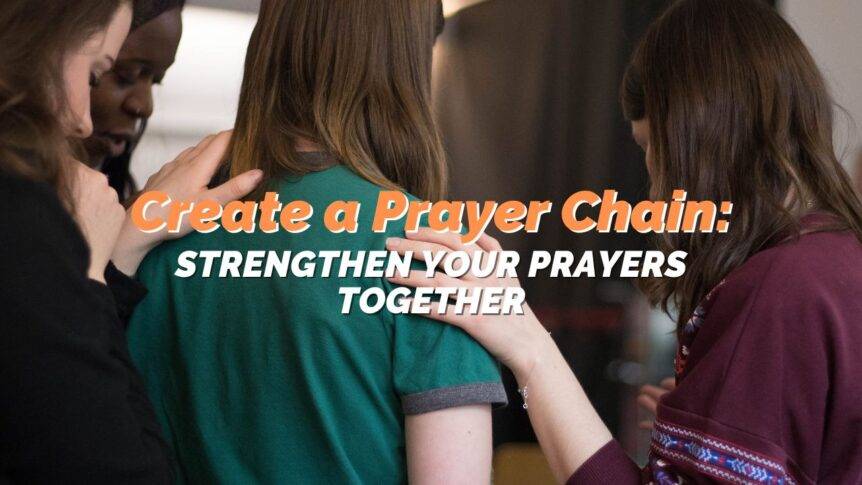Praying is a powerful tool that we as Christians have access to. At any moment, we can speak with God, and pray for not only our needs but those of others. Do you consider yourself a prayer warrior? Or perhaps you know someone who is!
“For where two or three gather in my name, there am I with them.” – Matthew 18:20
Today, we want to walk you through a “prayer chain” and what that looks like. Together, our prayers are multiplied and amplified. God is with us always, and by implementing a prayer chain, we can go on behalf of others who may not feel confident in their prayer life.
Table of contents
Estimated reading time: 0 minutes
What is a Prayer Chain?
A prayer chain is a group of people committed to praying for a specific reason, person for a pre-determined time. Typically, a prayer chain starts with one person who shares a prayer need with the group, then the request is passed along to the group members to pray over. Prayer chains are a powerful way for people to support one another and to lift their needs and hopes to God.
Prayer in the Bible

In Scripture, we are commanded to pray, making our requests known to our Lord Jesus Christ with thanksgiving (1 Thessalonians 5:17, Colossians 4:2, Philippians 4:6–7). Jesus gave His disciples instructions about prayer, including a model prayer in Matthew 5:5–12:
“Blessed are the meek, for they will inherit the earth. Blessed are those who hunger and thirst for righteousness, for they will be filled. Blessed are the merciful, for they will be shown mercy.Blessed are the pure in heart, for they will see God. Blessed are the peacemakers, for they will be called children of God. Blessed are those who are persecuted because of righteousness, for theirs is the kingdom of heaven. Blessed are you when people insult you, persecute you and falsely say all kinds of evil against you because of me. Rejoice and be glad, because great is your reward in heaven, for in the same way they persecuted the prophets who were before you.” Matthew 5:5-12
God wants to hear from His people. A well-organized prayer chain helps to inform God’s people concerning matters of prayer and also prompts them to pray.
James 5:16 says, “Confess your sins to each other and pray for each other so that you may be healed. The prayer of a righteous person is powerful and effective.” The concept of a prayer chain relates directly to that verse. We should confess our sins (and struggles) to each other and pray for one another. If God wills, our multitude of fervent prayers can avail much. We are not responsible for the outcome of the prayers, but we are commanded to pray, leaving us with peace that whatever matter we take to the Lord is in the best possible hands.
Other Verses
“Do not be anxious about anything, but in every situation, by prayer and petition, with thanksgiving, present your requests to God. And the peace of God, which transcends all understanding, will guard your hearts and your minds in Christ Jesus.” Philippians 4:6-7
God never promises how He will answer prayers, but He does promise to hear us (1 John 5:14). He also tells us that the prayer of a righteous person in community is powerful (James 5:16). Righteous does not mean that we must be sinless in order to pray, but it does mean that we must be right before God in confession, claiming the righteousness we have through Christ in faith (Ephesians 1:3–14; 1 John 1:9). Our adoption through Christ as children of God is linked with the repeated exhortation to pray without ceasing (1 Thessalonians 5:17) and to pray regularly and about everything (Philippians 4:6–7; Colossians 4:2).
Prayer chains, no matter if by phone, text, or online group messaging, are a powerful tool to facilitate intercession for our brothers and sisters in Christ, which God most certainly wants for His church (James 5:13–18; Ephesians 6:18). Prayer is our communication tool with God, and though He knows all and sees all, He still wants us to bring all concerns, praises, and questions to Him through prayer. He even promises to help is in our prayers through the Holy Spirit (Romans 8:26–27). Those praying need not necessarily feel specifically “gifted” in prayer in order to be a part of a prayer chain or group. It is the willing hearts of those praying that are most important.
How to Start a Prayer Chain

Here are some great prayer chain guidelines that will help you and others in your sphere have an effective prayer chain — one that’s ready to pray for any person, or any care, at any time.
1. Decide Whom to Include in Your Prayer Chain
Whoever you include should be dependable and willing to join in prayer, at a moment’s notice. These individuals can also expand the chain, even more, with like-minded people they know. Think about including your faith community, family, friends, neighbors, and colleagues.
2. Communicate Prayer Requests
You used to be limited to phone calls and word of mouth. Now with social media, the reach is endless! It’s easier than ever before to get the word out and have people praying instantly. Alternatively, build an email list that allows you to send prayer requests to everyone with one simple click.
3. Respect People’s Privacy
Prayer requests may not always come with an explanation. A request can just be a top-line explanation, such as, “Please pray for a woman who is going through a divorce.” Or “Add Martha to the prayer list.”
Being discreet is important if that’s what your loved one wants. Oftentimes, people are hesitant to share their prayers out loud with a large group of people.
4. Share Information Right Away
If you get word that the situation of one of your prayer recipients has changed, communicate it to everyone on your prayer chain so they may adjust their prayers. It’s important to keep everyone updated as time goes on.
The Do’s and Don’ts of a Prayer Chain
For your prayer ministry to be successful, these are the best practices for managing a prayer chain:
The Do’s:
- Respect privacy: If someone shares a prayer request with you, respect their privacy and only share the request with others if you have permission. It’s also best to give people the option to submit prayer requests anonymously.
- Respond with compassion: Reply to every request you receive. Let them know their need has been heard and passed along to your prayer network. No prayer is too small.
- Remain focused: Keep the focus of the prayer group on the specific needs that were submitted and avoid introducing unrelated topics. While it can be nice to chat with everyone, you have a specific mission in mind.
- Keep communication respectful: When communicating with others in the prayer chain, maintain a respectful tone and avoid negativity or criticism!
- Be timely: Don’t let prayer requests go unanswered. Every submission needs to be replied to as quickly as possible to prevent the sender from feeling neglected or ignored. It can be a huge deal for someone to reach out and ask for prayer, so let’s make sure we make them feel valued.
- Celebrate answers to prayer: If you receive updates or positive news related to a prayer request, share it with the group! This helps the team know their time and effort make a difference.
The Don’ts:
- Share private information: Avoid sharing sensitive information about others without their permission. Even if the person puts it in their prayer request, it’s best to reach back out to them to ask them to remove that info or if they are okay with such sensitive info being made public.
- Share the prayer requests outside of the prayer network: The sender submitted their request knowing your prayer team would see it. Unless you have their express consent to share it far and wide, make sure the chain of prayers remains in-house.
- Alter the requests: If you’re worried the information is too sensitive to share or there are too many typos, do NOT alter what was submitted. Reach out to the sender and ask them to make the necessary changes.
- Be intrusive: Don’t pry for more details or try to push someone to share more than they feel comfortable with. Listen to them, and make sure they feel heard.
- Engage in gossip: Avoid using a prayer chain as a platform for gossip and do not use it to promote personal agendas.
- Use them for commercial purposes: Do not use the prayer chain to promote products, services, or events. The moment the platform becomes a market, you lose the special intention behind the ministry.
- Be disruptive: Avoid disrupting the digital prayer chain with off-topic or irrelevant messages. If you meet in a weekly group, consider setting your phones on silent for the allotted time to ensure everyone stays focused.
- Make promises you can’t keep: Don’t commit to offering this service to people in need if you cannot fulfill that promise. Make sure you have a team in place that can help so that there is always someone who can act as prayer chain coordinator.
Email Prayer Chain

Email prayer chains have become the typical form of prayer chains. Emails can be sent to hundreds of recipients at a time for free and allow long-form communication, meaning people can submit prayer requests with as much detail as they need. When gathering prayer requests, make sure to require an email address with the submission so that they can be looped in on how the request is being circulated and prayed over.
The benefits of an Email Prayer Chain:
- People can participate from anywhere in the world
- Email is best for sending lengthy, detailed prayer requests
- You can send an email to hundreds of people at once
The negatives of an Email Prayer Chain:
- Someone could forward the message to someone who is not a part of the ministry, making it more difficult to maintain privacy
- As people forward the message, they may begin to add their own thoughts or words, which distracts from the original prayer need
- Some may habitually hit the “Reply All” option, which will frustrate and annoy other prayer warriors
- Emails can go unread for long periods of time
Texting Prayer Chain

A text chain works in a similar way to an email prayer chain, but instead of sending the request via email, it is sent via SMS. Text prayer chains can be an effective way to quickly spread a request for prayer to a group of people, especially when time is critical.
However, it’s important to be mindful of how often messages are being sent, as receiving frequent messages can be overwhelming and distracting for some people.
The benefits of an SMS Prayer Chain:
- Texting is best for sending urgent prayer needs
- Some people never check emails, but check texts on their phones frequently
The negatives of an SMS Prayer Chain:
- You can only send up to 20-25 people at a time in a standard group text
- Texts have a character limit, so you can only send shorter messages
- Though unlimited texting is common, some may incur a charge for sending and receiving texts
Promoting Your Prayer List

To get your faith community on board, you’ll need to rely on more than just a church bulletin. Follow these suggestions below for ways to grow your volunteer prayer team and your prayer request intake!
- Make a personal request: The #1 way to get more volunteers and more prayer submissions is a face-to-face request. Reach out to people personally and make a personal connection with them for their participation.
- Share the request on social media: Share a call to action for prayer requests through your social media accounts. This is the best way to gather prayer requests. Your prayer team can share the post, as well as other members of your church.
- Send an email or text message: Send an email or text message to a group of people who you think would be interested in joining the prayer ministry. Make sure to personalize the message and explain the situation.
- Partner with other ministries: There may be other churches in the area that already have a prayer chain ministry or a prayer team that you can partner with. Reach out to them to begin collaborating and expanding your impact in your city.
Praying Together
We hope you found this article helpful and encouraging. Gather your strongest prayer warriors together and get to work! God is waiting to answer your prayers, and fulfill His promises.





Comments 1
Would like to know more about chain prayer